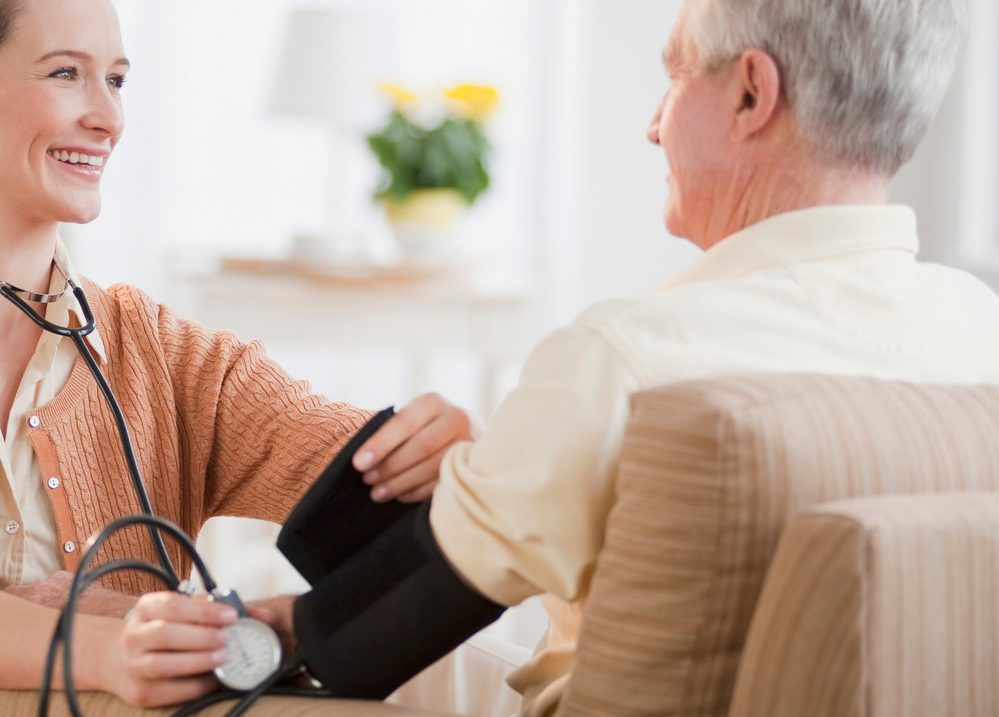Blood Pressure Management for Seniors

Medication and a healthier lifestyle — including good food choices, exercise, and avoiding alcohol — can beat high blood pressure. Here's what you should know.
High blood pressure, or hypertension, affects more than 45 percent of American adults. After the age of 60, that number jumps to nearly 75 percent.
Many people go years without understanding they have the condition, which may have no symptoms. You might notice headaches, chest pressure, or shortness of breath.
YOU MIGHT ALSO LIKE: Staying Socially Active as You Age
There’s a reason doctors routinely take your blood pressure. High numbers are a warning sign that you may be in danger of:
Getting your blood pressure down will help protect you.
Normal blood pressure
Blood pressure is described in two numbers — for example, 120/80 millimeters of mercury (mm Hg). The top number is systolic pressure, when your heart beats to pump blood. The second is diastolic pressure, when your heart is at rest between beats.
Under the most recent guidelines, your blood pressure isn’t normal unless it’s lower than 120 systolic and 80 diastolic. In between, your blood pressure could be elevated (120-129/less than 80) or in stage one of hypertension (130-139/80-89) or higher.
Lower targets have changed
In the past, doctors wanted to see a blood pressure of 140/90 in healthy adults up to age 64, and 150/80 in seniors. The lower target of 120 means that many people who thought their blood pressure was fine suddenly need to pay attention.
The current guidelines arose from the results of a large clinical trial of more than 9,000 adults 50 years and older. (About 28 percent were 75 or older.)
The study showed that treating people to lower their systolic blood pressure below 120 reduced their risk of death by 27 percent. The new target also saved lives in volunteers who had chronic kidney disease. Rates of heart attacks, heart failure, and strokes all fell within three years.
Do you need blood pressure medication?
Talk to your doctor about blood pressure medications. You may need more than one, but you have options. It may take a while for you and your doctor to find the combination that works best for you.
- Blood pressure medications include:
- Diuretics
- Angiotensin-converting enzyme (ACE) inhibitors
- Angiotensin II receptor blockers (ARBs)
- Calcium channel blockers
ACE inhibitors are prescribed more often than ARB blockers to people just starting to take blood pressure medication, but ARBs seem to work just as well and may be less likely to cause coughs, pancreatitis, and other side effects, according to an analysis of records covering 3 million patients.
For older patients, the preferred medication may be beta blockers. Beta blockers help your heart beat slower and with less force, which can lower your blood pressure. They can also widen your veins and arteries to improve blood circulation.
What you can do
If you have high blood pressure, you’ll have to control it for life. Other than medications, you should:
- Eat well
- Exercise
- Maintain a healthy weight
- Limit or skip alcohol
- Minimize the effects of stress
To keep lifestyle changes from becoming overwhelming, try one goal at a time and move to the next when you’ve achieved it.
You can follow the Dietary Approaches to Stop Hypertension (DASH) diet. You may be able to reduce the amount of medication you take.
With diet, you’ll eat whole wheat grain products, colorful vegetables, fruit, and low or fat-free dairy every day. You can have lean meat, such as poultry or fish — but probably less than you’re used to in a standard American diet. You can eat nuts and limited amounts of sweets and oils, too.
Staying as physically active as possible is also heart healthy. Your workout can lower your blood pressure. Check out the National Institute on Aging to find age appropriate exercises that will keep you on the move.
Blood pressure rises as weight increases, so try to lose weight. Aim for a good waist-to-hip ratio, below 0.95 in men and 0.85 in women.
Updated:
October 13, 2023
Reviewed By:
Christopher Nystuen, MD, MBA and Janet O'Dell, RN